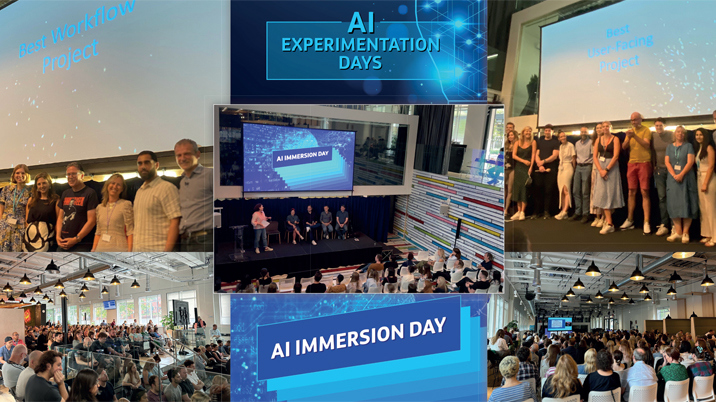
The word of 2023 for Gen Z gamers may well have been ‘rizz’, but the words issuing non-stop from the mouths of publishers last year were ‘generative AI’. Or, more honestly, what will generative AI mean for our business and how do we navigate the change?
This has been the debate at Immediate, as it has been everywhere else. But it’s a debate we are open to and a timely one to embrace. After all, we are a company of content creators and content creators are used to change.
In the two decades I’ve been creating content, there’s been a lot of it. From whom content is made by, to where it is discovered, its form and function, to the way it makes money. There’s been a lot of flux for a very long time.
Content teams are faced with an ever multiplying and diversifying list of demands; ‘make it data-led but authentic, optimised but relatable, modular but personal’. The conflicting list of requirements goes on and on.
So, it’s against this backdrop of confusing clamour that generative AI has emerged, bringing with it a storm of hype and panic but also the potential for some transformative solutions.
The debates on generative AI can seem extreme and polarising, ranging from the extinction of humanity to utopian fantasy futures. Immediate, however, adopts a pragmatic approach, carefully evaluating nuanced technology applications within the context of our industry’s challenges. Our focus is on preserving the core values our audiences appreciate about our work. How do we unlock the benefit of the technology whilst protecting what makes us great – the quality of our content.
The ever growing ask on content producers
Change is disconcerting but it isn’t optional. The rise of social media, multi-platform consumption, and the demand for interactive, personalised content have long been reshaping the parameters of media production. This has left publishers racing to stand still. Our purpose is still to inform, inspire and entertain just as it always has been. But our opportunities to do so are increasingly diverse. And whilst we are not short of ideas, we are short of hours in the day.
Gone are the days when a couple of word document features submitted to the sub editor was a sizeable delivery for a writer. Our multiformat content teams not only have to produce huge amounts of content every month to satisfy insatiable acquisition and engagement metrics, but they must also account for equally insatiable audience demands. They produce for multiple formats, from podcasts to Tik Toks, Reels and interactive tools. This expands beyond the digital landscape – to magazines and live events, because our audience is everywhere.
Finding the relevant tools and techniques to empower this process is imperative. We need to work smartly and efficiently but without compromising on the quality that underpins our brands. AI has in fact already been a part of this for a long time, in some ways. From the tools we use to spellcheck content, to the translation aids we use to make assets relevant internationally. This next iteration is revolutionary for sure. But it is evolutionary too.
Generative AI’s potential to revolutionise the editorial workflow
Generative AI’s explosion in 2023 however is undeniable. In just two months, ChatGPT reached 100 million users, a growth figure than took Tik Tok nine months to achieve and Instagram more than two and a half years.
We quickly realised at Immediate that this new iteration could revolutionise our traditional editorial workflows and help us where we needed it most – creating more time. Rather than viewing it as a threat to jobs and talents, we looked at how it could enhance productivity and ease the burden of time-consuming, repetitive tasks. How could we use it to lower the burden of administrative inefficiency and reinvest that time in the creativity and ideation that makes our output great?
Empowering efficiency: Our roadmap for embracing generative AI
The first fundamental challenge was where to start. There are endless tasks that can be optimised through AI, from data analysis to content formatting. The key was identifying which areas would deliver impact first. The people who can answer this question are the people who understand the granular workflow. But those people were often unfamiliar with AI, so we needed to embark on a learning journey and get everyone immersed.
We started with a comprehensive AI immersion day, where everyone from our admin teams to our C-Suite were taught the basic workings, science, and potential impacts of AI. We hosted an impressive array of speakers, who debated AI from all angles. We had experts from Microsoft and Hurbert Burda Media explaining the science behind the headlines and the practical applications in market now.
There was also an AI ethics academic explaining power and bias mechanics and the importance of critical thought. And we heard from AI start-up founders explaining some of the emerging trends and tools. We wanted to leave teams with a rounded but informed view from which to explore AI.
Then we wanted to empower them with the skills to play themselves. This empowerment took the form of practical workshops, covering skills as diverse as vectorisation and prompt writing. All with the aim of making tools and terminology more accessible so personal experimentation could carry on.
The reaction to this immersion was overwhelmingly positive. Initial fear and hesitation subsided as teams gained confidence and competence. Most importantly, we saw the power of the collective emerge. The more diverse minds and experiences engaged with AI, the richer the ideas became, as we all gained a more nuanced understanding of its potential. An important point to understand is that we are training AI as much as we are training in AI, so this diversity of input and influence is imperative to success.
Product innovation through AI
AI isn’t just about making our existing processes more efficient. The grander narrative is about realising new possibilities to create. The next step on our AI journey was to take this new familiarity and confidence and set it to work creating the new.
A month after our immersion day, we organised a company-wide experimentation programme where people from different departments collaborated on projects that used AI for both workflow improvements and customer-facing propositions.
The results were impressive. Over 70 projects were put forward for consideration, with 24 worked on over a ringfenced two-days, and an ongoing pipeline of experimentation activity created. The ideas are diverse and diverting, but all demonstrate the real-world application of AI within our business. Awards have been given for a range of criteria, including team spirit, customer value and innovative use of tech.
Teams have created puzzles, chatbots and concepts for new brands. We are experimenting with formats and layouts to help neurodiverse audiences and looking at how vectorisation within our databases can unlock an archive stuffed with past treasure. It is truly inspiring stuff.
Navigating Risks: Ensuring guardrails around AI use
While our approach is positive, we are of course cognisant of AI risks. We have been meticulous in addressing them. Guardrails were established to prevent unauthorised access to sensitive information, and legal and data security teams were actively involved. We recognise the importance of human oversight in the content creation process. Our focus will always be on using AI to make efficiencies and innovations within our own content and data, not relying on or repurposing that of others.
Our brands are built on foundations of trust and integrity, and we will not allow any AI activities to undermine that. We remain committed to training models using our own content and IP, avoiding any unintended infringement of copyright laws, misinformation, or replication of bias. We govern all our experimentations by the same guardrails and workflows that have always underpinned our rigorous editorial standards.
Staff reaction to AI: Knowledge is power
With all technological breakthroughs there is always trepidation. So, the start point must be information and learning. Knowledge to explore and assess tools from a personal perspective is how both we and the tools become more informed. The macro conversations about democracy, power, privilege, and bias are important complex topics that demand scrutiny. But in order to adequately scrutinise, people need to engage.
Education is the cornerstone of our AI experimentation and through it both knowledge and optimism have continued to grow. As teams realise the benefits in both productivity and innovation, creativity is building. Both with the technical opportunities it provides and the time saving it will deliver. However, it is an ongoing conversation. We are a people-centred business, so the learning and sharing remains constant, open and honest.
The future landscape: Media trust in the age of automation
As much as the impacts are felt for our business, they’re felt by our audiences too. One of the biggest areas of focus for our AI-thinking is the changed reality of our customers’ behaviour as a result of the technology. What will media consumption look like in a world awash with automated content? What will audiences and algorithms favour and what will be the role of personalities and brands?
My gut feel is that brand trust, lived experience, and human oversight will become paramount. And we see these trends reflected in emerging search generative experience as well as the continuing rise of influencer personalities across all platforms. Immediate is not just a content creator but a content business with proven experience, expertise, and audience connection, alongside an archive of trusted content and data.
In a landscape where anyone can produce content, the brands with authenticity, expertise, and a commitment to editorial integrity will stand out. So, whilst our journey into the world of generative AI at Immediate may well be transformative, it will be familiar too.
We will continue to evaluate and harness new tools to empower creativity; and ensure our expert teams have the time and focus to create and innovate the new and the real. The challenge of too little time is an old one, but AI may well prove an important tool. Indeed, the secret to securing our rizz.
This article was first published in InPublishing magazine. If you would like to be added to the free mailing list to receive the magazine, please register here.












